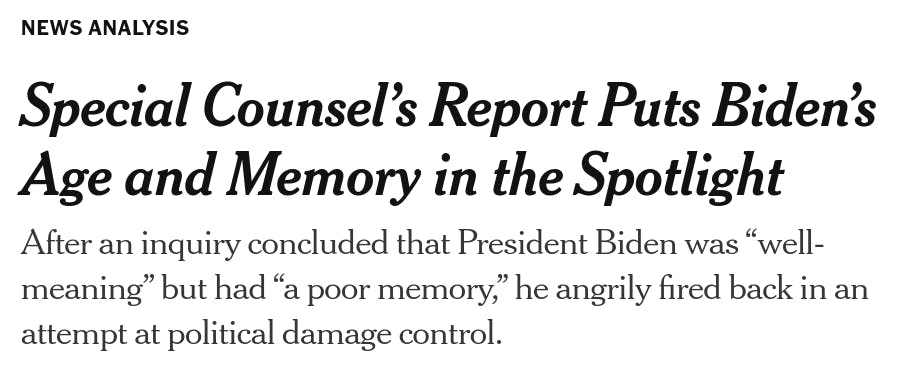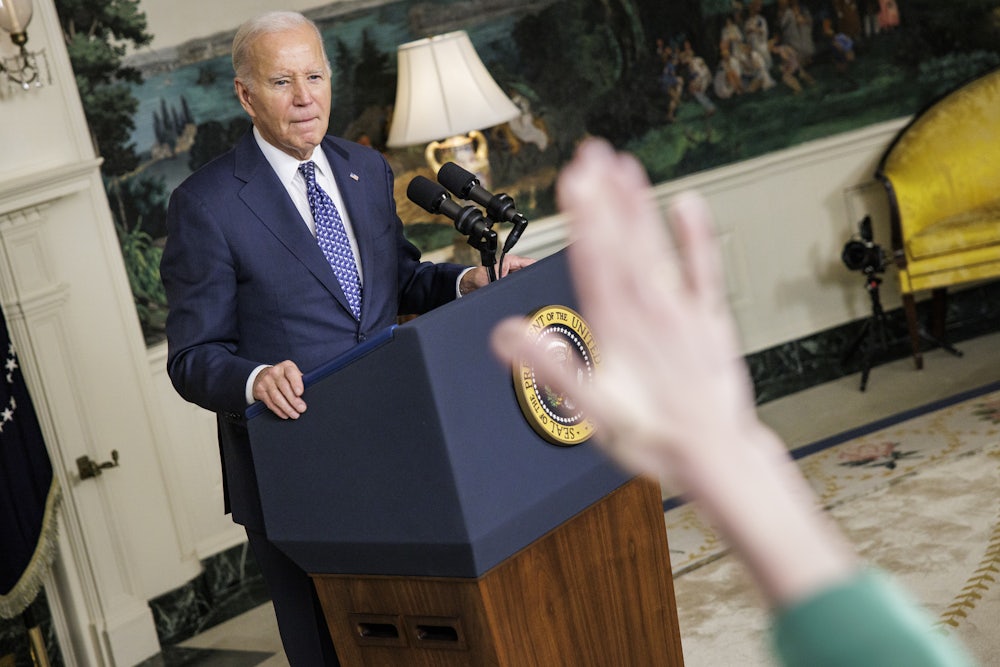For many liberals and Democrats, the release of a new, harshly worded special counsel report on President Biden is stirring terrible flashbacks to 2016. Just as a Justice Department finding on Hillary Clinton’s emails produced absurdly skewed media coverage that helped sink her candidacy, so too is the new report generating questionable editorial choices that threaten political harm to Biden.
But this can serve as a wake-up moment for Democrats. It’s a reminder that there’s always another “but her emails” moment lurking around the next corner—and that Republicans ruthlessly exploit such episodes with tactics that Democrats still struggle to respond to, resulting in press coverage that unduly reflects GOP frames. They should be prepared next time.
Let’s first acknowledge this right at the outset: The report from special counsel Robert Hur does find that Biden seriously mishandled classified material, though Hur found no basis to criminally prosecute him for it. The report documents that Biden “willfully retained” classified documents as a private citizen relating to his work as Barack Obama’s vice president, including national security materials involving the U.S. war in Afghanistan. That’s bad.
But as serious as that is, media coverage of the findings has already gone overboard. News analysis pieces are focusing on Hur’s declaration that during the investigation, Biden came across as a “well-meaning, elderly man with a poor memory” and displayed “diminished faculties in advancing age”:

Note the weaselly construction: If the report “puts Biden’s age and memory in the spotlight,” it’s at least partly because Republicans have seized on those particular lines from the inquiry, and because the coverage has used that fact as the hook to emphasize them.
Indeed, that New York Times analysis claims those details were “quickly seized on by Republicans,” and could “set the stage” for “a fresh round of political attacks” on Biden. You might call this the “ammo device”: Because the opposition will seize on this or that piece of information as “ammunition” to launch a political attack, that itself becomes the justification for centralizing the importance of that info, packaged as an analysis of its political significance.
But in this case, those findings in the report are both being manipulated dishonestly by Republicans and are largely tangential to the report’s most important finding. Republicans are claiming the special counsel opted against charges for Biden because of his “age related dementia,” with many jumping on that idea to declare that this showed him to be unfit for office.
But that’s a serious distortion of what Hur’s report actually says.
One of Hur’s key findings is that at one point in 2017, in private life, Biden appeared to allude to classified documents in his position. Hur concluded that a jury would not place sufficient “evidentiary weight” on that one instance, given Biden’s “limited precision and recall.”
Yet Hur also reached that conclusion for another reason. He explicitly declares that a jury would be unlikely to convict “in the absence of other, more direct evidence” that Biden willfully and improperly hoarded that classified information. Hur says investigators “searched” for such evidence, but “found it wanting,” adding that “no witness, photo, email, text message, or any other evidence” was discovered. That’s why a jury would be unlikely to convict. Hur found similarly on other allegations, too.
Because of all this, many have whacked Hur for including those details about Biden’s memory during the investigation. Some have sharply criticized Attorney General Merrick Garland (who appointed Hur) for presiding over this debacle. After all, those details were not nearly as essential to Hur’s conclusion as was his failure to produce sufficient evidence of Biden’s criminality.
Biden’s age is a real issue, and no one denies this. But the real rub here is that news analysis pieces elevating the material about his age did so by editorial choice. Other, better editorial choices were available.
Importantly, Hur’s report extensively noted that Biden cooperated with requests that he search for and turn over classified documents in his possession, casting doubt on whether he harbored corrupt intent. The report drew a powerful distinction between Biden and Trump, who is facing criminal charges for his document hoarding:
Most notably, after being given multiple chances to return classified documents and avoid prosecution, Mr. Trump allegedly did the opposite. According to the indictment, he not only refused to return the documents for many months, but he also obstructed justice by enlisting others to destroy evidence and then to lie about it. In contrast, Mr. Biden turned in classified documents…consented to the search of multiple locations including his homes, sat for a voluntary interview, and in other ways cooperated with the investigation.
You’d think this might make a good topic for news analysis pieces. Here’s a hypothetical:
News Analysis
Report Highlights Stark Difference Between Biden and Trump on Classified Information
Special counsel findings show that Biden retained classified documents, as Trump did, but cooperated with investigators where Trump did not.
That’s flatly factual. And given that voters will soon decide which of the two men to entrust with the presidency, this direct contrast in how they handled the awesome responsibilities of that office seems at least as relevant to voters as Biden’s memory, or more so.
To be clear, one could choose news analysis topics that are highly unflattering to Biden while also being more informative to voters than age-focused analyses have been. A piece questioning how Biden could commit such missteps given his long experience in national security affairs would be fair game—damning and also more useful to voters deciding on who the next president should be.
As it happens, one of the key pieces of evidence—that Biden forgot the timing of his son’s death—is simply not credible, as Josh Marshall notes. Biden forcefully denied it at a press conference late Thursday, and his performance gave the lie to the report’s allegations.
On top of all that, journalists like John Harwood and Paul Krugman report that their direct interactions with Biden also wreck Republican claims of senility and dementia.
But because the age-related details in Hur’s report were “quickly seized on by Republicans,” those get all the ink and pixels. Other approaches—again, including ones that also might be damning to Biden—would surely be more informative to voters.
All of this is a rerun of the Hillary emails fiasco in 2016: The new information that Republicans seized on was of uncertain importance, yet editorial decisions were made to give it outsize significance precisely because GOP attacks over it might impact the race, which itself became the news.
As Brian Beutler writes on Substack, Democrats should ponder why Republicans often use such details to manipulate the discourse so effectively, and think harder about how to showcase Biden’s fitness for the presidency. They should declare forthrightly that media coverage is being gamed by GOP manipulation, making GOP dishonesty part of the story. Imagine if they’d jumped on the Hur report’s contrast between Biden and Trump, directing the media herd in that direction?
Fortunately, this blowup occurred eight months before Election Day, as opposed to much later in the campaign season, as in 2016. But Democrats have been warned: This will happen again, and again, and again. As for the media, many still angrily reject the idea that anything was amiss in 2016. They’re wrong. And this time they should do better.










